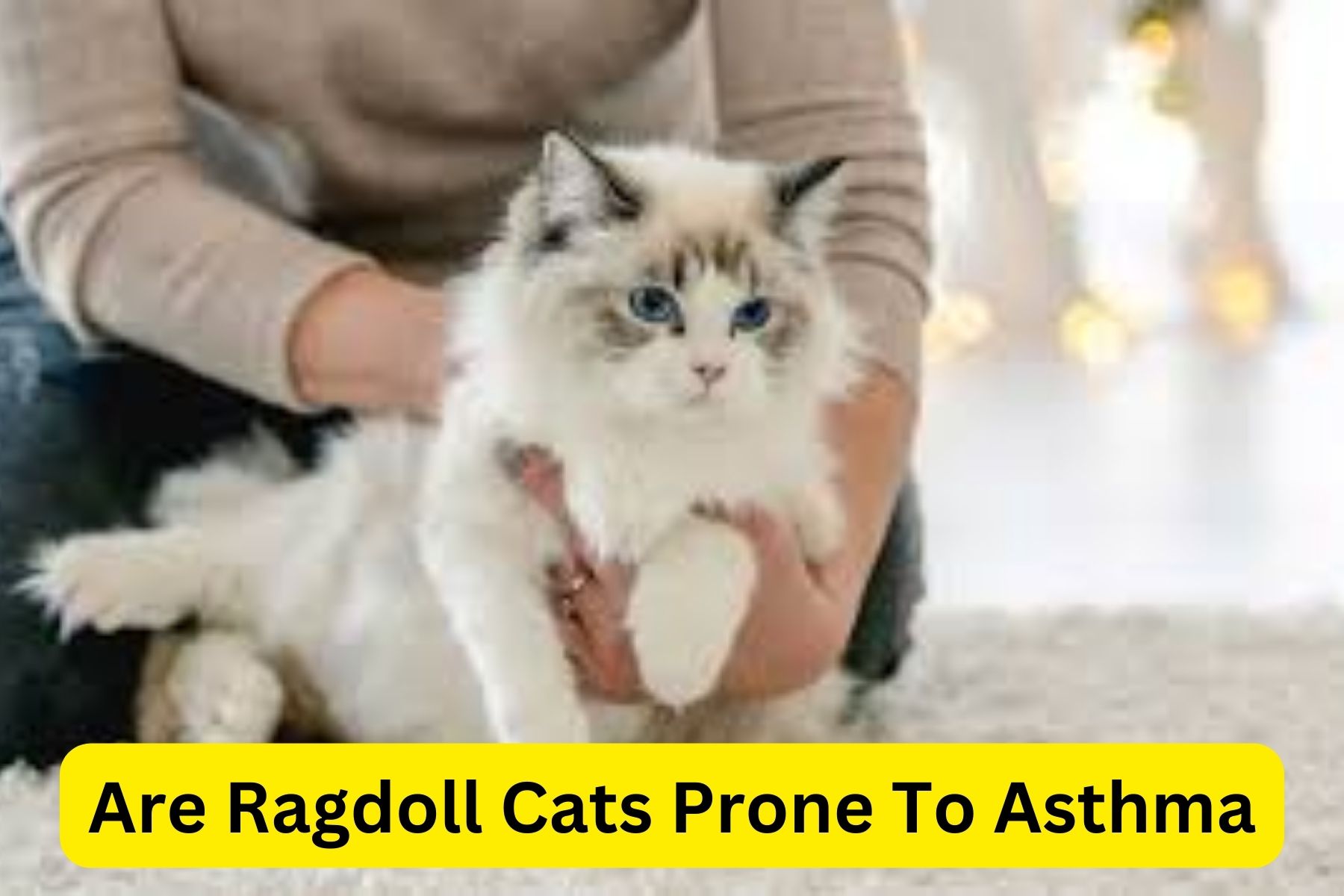Unlike other pedigree cat breeds, ragdolls are generally healthy and disease-free. But are ragdoll cats susceptible to asthma or other health issues? Let’s find out.
What is Asthma in Cats?
Before we go into whether ragdoll cats are prone to asthma, let’s define feline asthma. Feline asthma is a respiratory condition in cats that is quite similar to asthma in humans.
A cat with asthma will have difficulty breathing due to an allergic reaction to airborne particles. Cats absorb these particles, which could be dust, mold, or pollen spores. This would not be a problem for a healthy cat, but in an asthmatic cat, an aberrant response is generated.

A cat with asthma’s immune system misidentifies inhaled spores as harmful foreign objects. This hypersensitivity causes a heightened immunological response, often known as an allergic reaction.
This allergic reaction narrows the airways, making breathing difficult. It just takes a small amount of allergen to elicit an allergic response and produce an asthma attack. Asthma in cats is a terrible disease, but with the right medication and management, these cats can live long and healthy lives.
Are Ragdoll Cats prone to Asthma?
Ragdoll cats can acquire asthma, although they are no more likely to do so than other cat breeds. In fact, the Siamese and Himalayan cat varieties are more prone to asthma than the ragdoll.
Asthma in cats is not breed-specific; cats of any breed, color, or age can develop the disease. This means that while your ragdoll may be susceptible to asthma, so is the crossbreed cat next door.
Ragdoll cats are more likely to get asthma due to their living conditions. Ragdoll cats are typically kept indoors and may not have as much access to fresh air as a cat permitted to roam outside. Dust mites and other household spores are typical triggers for asthma in cats.
So, if your ragdoll cat lives inside, it’s a good idea to attempt to limit his or her exposure to harmful allergens. Vacuum any locations where spores can accumulate, such as carpets and beneath furniture, and keep the house well ventilated. If your cat is allergic to pollen, avoid bringing flowers into the home.
Free-Space Cat Inhaler Spacer, specifically designed for cats, with round shape silicone mask and breathing indicator.
Are Ragdoll cats prone to asthma?
Ragdoll cats, like all cats, may be susceptible to certain infections that can cause breathing problems. Some of them affect all felines, while others are more common in ragdoll cats than in other breeds.
Fortunately, the most frequent infections that cause breathing issues in cats, such as feline influenza, can be prevented with immunization. Following the prescribed immunization routine can help to prevent certain infections.
Around 30% of ragdoll cats are genetically predisposed to hypertrophic cardiomyopathy. This can lead to heart failure at an early age, and one of the most common symptoms is difficulty breathing. Cats with this illness will require lifetime medication because it is incurable.
What other diseases are Ragdoll cats prone to?
Ragdolls, like most other long-haired cat breeds, are prone to hairballs. This occurs when the cat self-grooms and consumes a considerable volume of hair. These bowls of hair are typically vomited up, but they can occasionally produce a more serious blockage in the gastrointestinal tract.
Ragdoll cats are prone to obesity because of their laid-back temperament. They can be playful, yet they like to relax with their owners. If you have a ragdoll cat in your household, you should keep a close eye on its weight and encourage it to play and exercise regularly.
What other diseases are ragdoll cats prone to?
Urinary system problems, including as cystitis and bladder stones, are also common in ragdoll cats. Cats that dwell completely indoors are more likely to develop urinary tract problems than those who have access to the outside world. Urinary tract disorders in cats can be serious, so keep a close eye on their urine production.
As we have learnt, ragdoll cats are susceptible to asthma, but this applies to any breed or type of cat. Ragdolls are not more likely than other cat breeds to acquire asthma, although some will get it for the rest of their lives. Asthma in cats can be devastating, but with the right medication and management measures, they can live long and happy lives.
Do you have a ragdoll cat who has trouble breathing on a daily basis? Or perhaps you have some queries regarding how to care for an asthmatic cat? Leave a remark and we’ll get back to you!
FAQ’s
Which ailments are Ragdoll cats prone to?
Ragdoll cats are susceptible to the same infectious diseases as other cats and should be vaccinated in accordance with your local veterinarian clinic’s immunization program. Some ragdoll cats also contain a gene that makes them susceptible to a type of heart disease that can cause heart failure at an early age.
Do ragdolls have respiratory problems?
Ragdoll cats may suffer from breathing problems caused by a genetic form of heart disease or a type of feline asthma.
Can Ragdolls become sick easily?
Ragdoll cats are a sturdy and healthy type of cat that does not get sick frequently. Like all cats, they are susceptible to viral infections and have a genetic predisposition to certain chronic cardiovascular health issues.
Why is my Ragdoll breathing heavily?
Your ragdoll may be breathing heavily due to a simple cause, such as overexertion or stress. However, if your cat’s breathing does not rapidly return to normal, or if he frequently has difficulties breathing, you should seek veterinarian help.
